Japan was a soccer backwater when the J.League started 30 years ago, but its success has helped the sport thrive in the country and turned the national team into FIFA World Cup regulars.
The J.League starts its new season tomorrow, and has come a long way since it launched in 1993 in a blaze of flashing lights, rock guitars and fireworks at Tokyo’s National Stadium.
The league’s inaugural season featured 10 teams, but there are now 60 from all over Japan playing in three divisions.
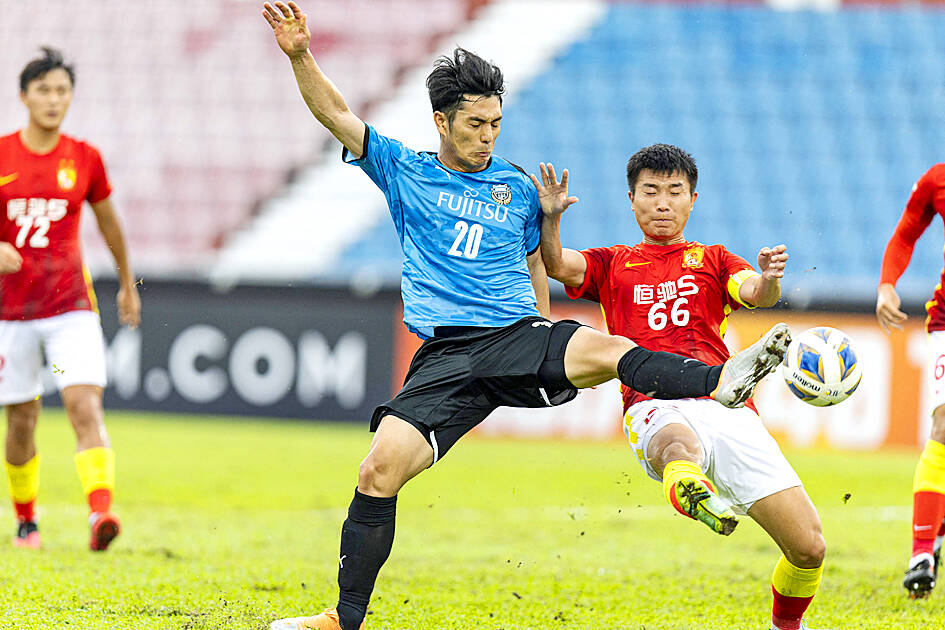
Photo: AFP
Clubs have become an important part of their local communities and J.League chairman Yoshikazu Nonomura said that “football culture has taken root in Japan.”
“When the league began, I think a lot of people thought of it as just flashy entertainment,” he said. “Now 30 years have passed, and I think we are getting close to the real J.League that we were aiming for.”
The J.League brought professional soccer to Japan and replaced the company teams of the old corporate league with clubs representing their local areas.
Big-name signings such as Zico and Gary Lineker helped boost the new league’s profile, while local players such as Kazuyoshi Miura became huge stars.
The improved standard helped Japan’s national team, who had never qualified for a World Cup at the time.
They made their debut appearance in France in 1998 and have never missed a World Cup since. They have also been crowned Asian champions a record four times.
Kengo Nakamura, who played at the 2010 World Cup, said the J.League has been “the foundation” for the national team’s improved fortunes.
“The J.League started and we became professional, and with that the awareness, motivation and quality of the players increased,” he said.
European clubs began taking an interest in Japanese players soon after the J.League began, with Miura and Hidetoshi Nakata signing for Italian clubs.
The flow of players moving overseas has increased over the years — only seven of Japan’s squad at last year’s World Cup in Qatar were with J.League clubs. The trend has helped Japan on the international stage, but left a void in the J.League.
“I personally want to see more J.League players in the national team, because that would get people excited about the J.League,” said Nakamura, who made almost 700 appearances for Kawasaki Frontale.
“If the national team play and then you say to people: ‘Ok, let’s watch the J.League now,’ they say, ‘Well, who can we watch?’” he said.
Frontale have won the J.League four times in the past six seasons, but have seen five Japan internationals, including Brighton & Hove Albion winger Kaoru Mitoma, leave over the past two years.
Nakamura said it is difficult to stop players moving to Europe, and believes the trend “might even accelerate” in the years to come.
The league still attracts a small number of well-known players, albeit usually past their prime.
Defender Tomoaki Makino, who played with Andres Iniesta at Kobe last season before retiring, said that the league needs those big names because it raises the overall quality.
“It also puts a good kind of pressure on the whole club, for example with medical facilities, publicity and recruitment,” he said.
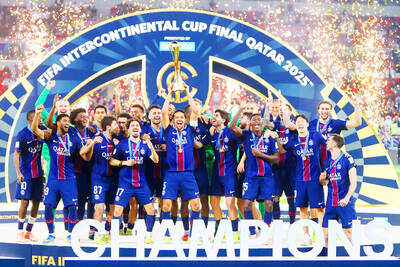
LOW-GOAL SHOOT-OUT: Of the nine penalties in the shoot-out, only three went in, with Flamengo’s Samuel Lino, and Vitinha and Nuno Mendes of PSG netting Matvei Safonov on Wednesday made four straight penalty saves in a penalty shoot-out to help Paris Saint-Germain beat Flamengo in the Intercontinental Cup final and win a sixth trophy of the year. The Russian goalkeeper was thrown in the air by his teammates after his exploits in the shoot-out, which was won 2-1 by PSG after a 1-1 draw after extra-time. It completed a trophy-laden 12 months for the French team, who had already won the Trophee des Champions, Ligue 1, the Coupe de France, the UEFA Champions League and the UEFA Super Cup — also on penalties against Tottenham Hotspur in
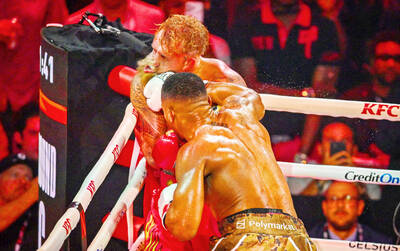
LACKLUSTER FIGHT: At one stage, the referee lost patience with the two fighters, warning them in the fourth round that ‘the fans did not pay to see this crap’ Former world heavyweight champion Anthony Joshua on Friday knocked out YouTuber-turned-boxer Jake Paul in their controversial Netflix-backed bout in Miami. The fight at the Kaseya Center, which saw both men reportedly splitting a mammoth purse of US$184 million, had triggered alarm across boxing due to the gulf in physical size and class between Britain’s two-time former world champion Joshua and Paul, an Internet personality who has forged a lucrative career through a handful of novelty boxing contests. However, in the event, Joshua made hard work of defeating his vastly less accomplished opponent, before his superior size and power eventually told
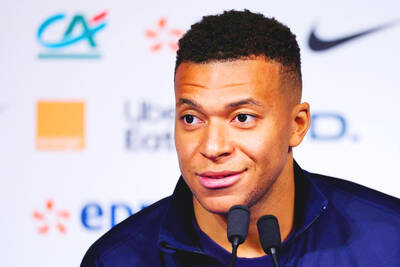
Paris Saint-Germain (PSG) were ordered on Tuesday by a French labor court to pay their former forward Kylian Mbappe up to 61 million euros (US$71.6 million) in unpaid wages and bonuses. France captain Mbappe, who left PSG in June last year to join Real Madrid, had been claiming more than 260 million euros in total from his former club. PSG in turn had demanded Mbappe pay them 440 million euros. Mbappe, 26, also claimed the Qatari-owned reigning European champions had applied the wrong French legal classification to his contract, but that was rejected by the court. The labor court said
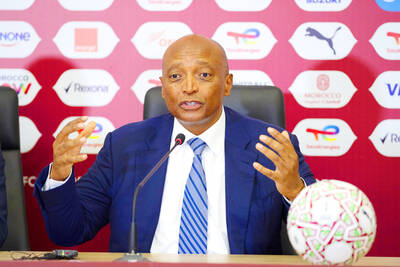
The Africa Cup of Nations (AFCON) would in future be held every four years instead of every two years, the Confederation of African Football (CAF) said on Saturday. The surprise decision was made at the body’s executive committee meeting in Rabat and announced at a news conference by CAF president Patrice Motsepe. The tournament, which brings in an estimated 80 percent of CAF’s revenue, has traditionally been held every two years since its inception in 1957. Yesterday marked the start of the 35th edition, hosted in Morocco with the home team taking on Comoros. Motsepe said the next AFCON finals,